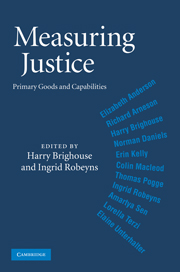Book contents
- Frontmatter
- Contents
- List of contributors
- Acknowledgments
- 1 Introduction: Social primary goods and capabilities as metrics of justice
- PART I THEORY
- PART II APPLICATIONS
- 6 Capabilities, opportunity, and health
- 7 What metric of justice for disabled people? Capability and disability
- 8 Primary goods, capabilities, and children
- 9 Education for primary goods or for capabilities?
- 10 Gender and the metric of justice
- PART III CONCLUDING ESSAY
- Index
- References
6 - Capabilities, opportunity, and health
Published online by Cambridge University Press: 05 June 2012
- Frontmatter
- Contents
- List of contributors
- Acknowledgments
- 1 Introduction: Social primary goods and capabilities as metrics of justice
- PART I THEORY
- PART II APPLICATIONS
- 6 Capabilities, opportunity, and health
- 7 What metric of justice for disabled people? Capability and disability
- 8 Primary goods, capabilities, and children
- 9 Education for primary goods or for capabilities?
- 10 Gender and the metric of justice
- PART III CONCLUDING ESSAY
- Index
- References
Summary
HISTORY OF A CONTROVERSY
Should we focus on human capabilities, as Sen (1980, 1999) and Nussbaum and Sen (1993, 2000) propose, albeit with differences in their views, or on Rawls's (1971, 1993) account of primary social goods, when we think about health and health policy? In this paper I argue that there is more convergence than difference between an account of justice and health that focuses on opportunity, properly construed, and one that sees the target of justice as protecting human capabilities. To make my case, I shall have to say more about what such an opportunity-based account looks like and compare the kinds of claims it supports about health policy with those based on capabilities. Both approaches, I shall also argue, must be supplemented with an account of fair deliberative process in order to achieve legitimacy in priority setting. First, however, I want to go back to the origins of the dispute about the target of justice.
Sen's advocacy of capabilities as the target of egalitarian concerns – the relevant space in which we care about inequalities among persons – originated as a response to an idealizing simplification Rawls makes in constructing his theory of justice as fairness. Rawls, as is well known, assumes that his hypothetical contractors who are seeking fair terms of cooperation are fully functional over a normal lifespan.
- Type
- Chapter
- Information
- Measuring JusticePrimary Goods and Capabilities, pp. 131 - 149Publisher: Cambridge University PressPrint publication year: 2010
References
- 16
- Cited by

